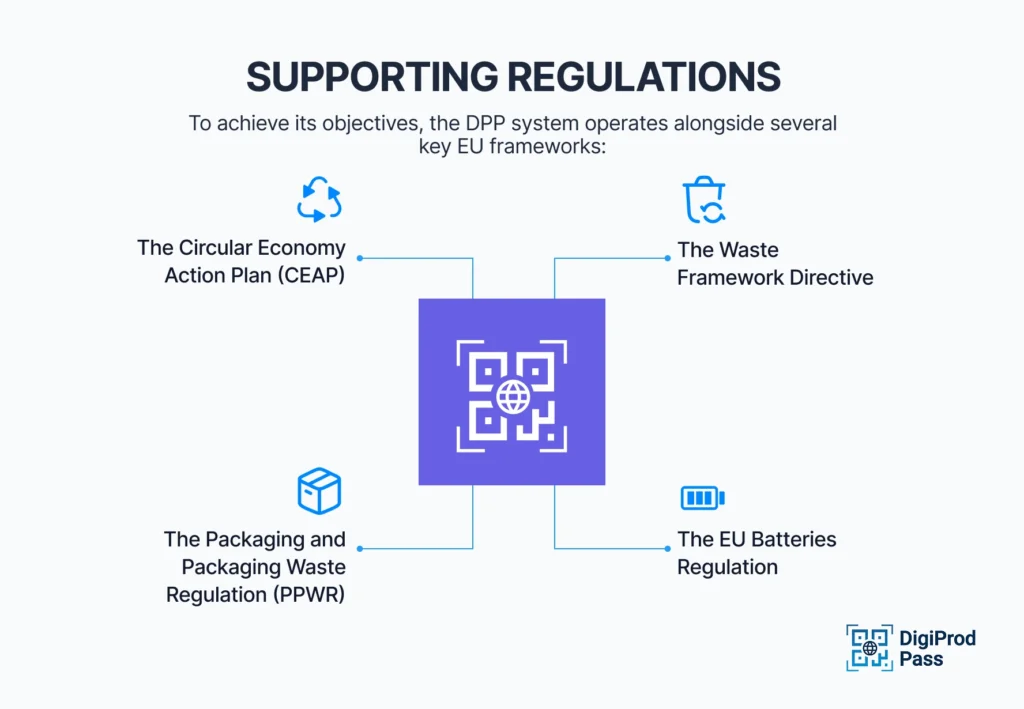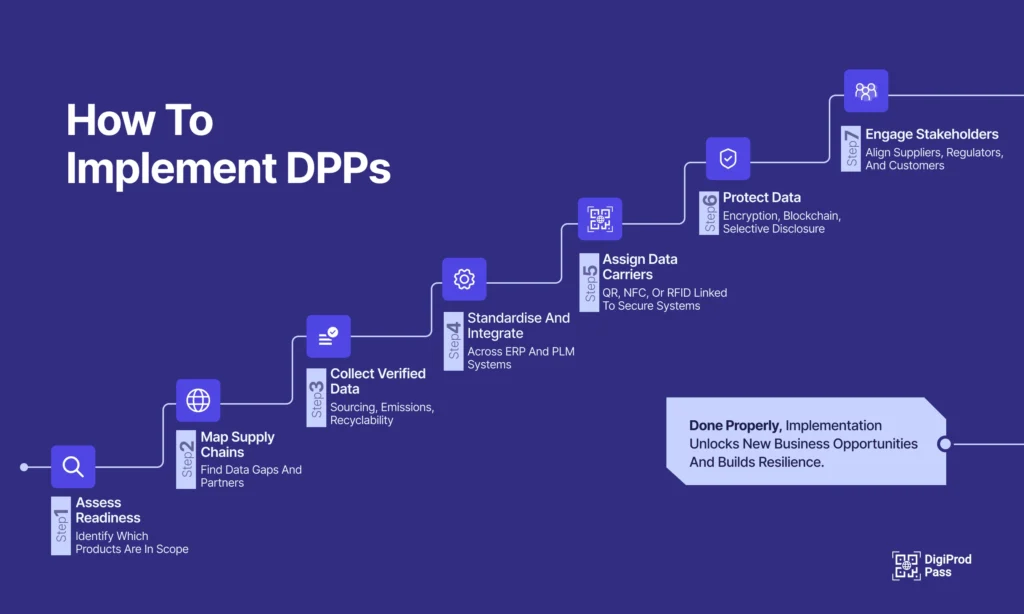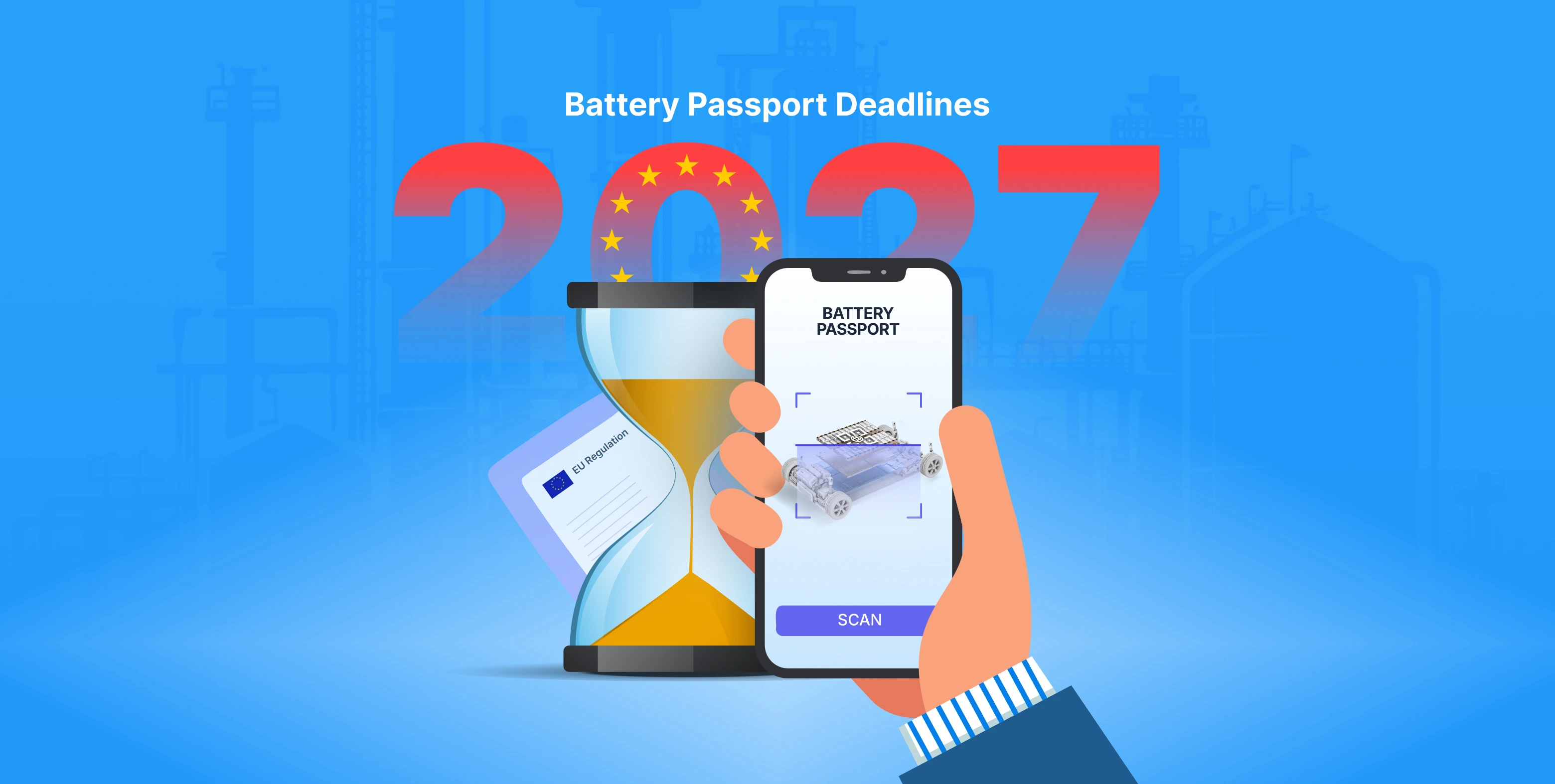
Digital Product Passports (DPPs) are a mandatory requirement to sell products in the EU market as per the Ecodesign for Sustainable Products Regulation (ESPR), adopted by the European Union in 2024. Rollout starts with batteries in 2027, extends to steel, aluminium, textiles, furniture, tyres, mattresses, and energy-related products to boost the circular economy. New rules will also promote repairability and recyclability, including a repairability score for electronics.
Digital Product Passports (DPPs) offer mutual benefits for all stakeholders. For businesses, they extend beyond mere compliance, providing crucial insights into supply chain transparency, facilitating the development of circular business models, and fostering consumer trust through verifiable sustainability data.
Regulators gain access to traceable and consistent data, while consumers are empowered with transparent information to make informed, environmentally conscious, sustainable choices.
A Digital Product Passport is a verified digital record that details a product's entire value chain, its recycling and upcycling possibilities, particularly its sustainability profile.
Similar to a travel passport uniquely identifies a person, a DPP creates a digital identity for products. Each one is linked to a unique product identifier and made machine-readable, usually via technologies such as QR code, NFC tag, or RFID chip.
A DPP serves as a comprehensive digital record for a product, encompassing a wealth of information throughout its lifecycle.
While the specific details can vary depending on the industry and product type, a typical DPP generally includes critical information such as:
Beyond these core elements, a DPP can be further enriched with data on manufacturing processes, supply chain transparency, ethical sourcing, product authenticity, warranty information, and even user manuals, test reports and software updates.
The overarching goal of a DPP is to enhance transparency, enable informed decision-making for consumers and businesses, facilitate circular economy practices, and ultimately contribute to more sustainable consumption and production patterns across various sectors.
This information is standardised, secure, and accessible throughout the value chain. Suppliers, manufacturers, regulators, and consumers can all access the level of detail they need creating trust, traceability, and accountability.
The ESPR replaces and expands earlier eco-design rules, which previously applied mainly to energy-related products. Under the new regulation, nearly all physical goods placed on the EU market fall within its scope.
Preparation began in 2024, when pilot categories such as batteries, consumer electronics, furniture, tyres, mattresses, steel, aluminium, and textiles were instructed to start integrating DPP systems. From 2026 onwards, new product groups will gradually be added, leading to full enforcement by 2030.

Together, these regulations establish a unified framework for sustainable product design, data transparency, and circular business models, ensuring that resources remain traceable, reusable, and compliant across their entire lifecycle.
Although manufacturers will lead the rollout, the responsibility is shared across the market.

Digital product passport helps businesses to validate green claims, provide transparent product histories, and ensure products meet sustainability targets. Companies can improve regulatory compliance and stand out in competitive markets by embedding verifiable DPP data into each product .
DPPs enhance brand credibility, help meet ESG goals, and enable new revenue streams such as:
For example, Breitling now uses blockchain-powered digital product passports for its luxury watches, enabling customers to verify authenticity and service history while supporting product durability.
In consumer electronics, where waste and obsolescence are growing concerns, DPPs provide essential insights into material use, energy consumption, and end-of-life options, enhancing both brand credibility and customer loyalty.
One of the DPP’s main goals is enabling consumers to make better, more responsible purchase decisions. With access to a product’s environmental impact, origin, and repair potential, it encourages people to make more sustainable choices and discourages greenwashing.
This supports a broader shift toward sustainable products and responsible consumption. Verified data helps customers distinguish proper ethical brands from companies that only market sustainability.
As enhanced transparency becomes the standard, it will improve buyer confidence, particularly in resale and repair markets. Whether purchasing a smartphone, sofa, or jacket, the DPP allows for confident and informed decisions.
DPPs give governments and EU institutions the tools they need to monitor environmental policies in real time. With reliable, comprehensive information on emissions, waste, and circularity, policymakers can confirm whether products meet sustainability targets and enforce bans on non-compliant goods.
More importantly, DPPs will provide a consistent evidence base for policy development. By aligning data across sectors, they support harmonisation between relevant regulations and create fairer markets across multiple sectors.
This data-driven approach is central to the European Union’s ambitions for a resilient, resource-efficient economy.
The European Commission has prioritised several product categories for the rollout of digital product passports (DPPs). These sectors are among the highest contributors to waste, emissions, and unsustainable practices in the EU market.
With increasing regulatory attention and shifting consumer expectations, DPPs are helping reshape these industries for a more circular economy.
The Battery Passport is the first mandatory DPP, coming into force in 2027. It tracks:
For electric vehicles and renewable energy systems, this will be transformative, creating transparency where there was previously opacity.
From 2027, DPPs will apply to all textiles sold in the EU. Brands must provide:
Electronics face growing pressure from e-waste regulation. DPPs will provide:
This supports right-to-repair laws and extends product lifecycles.
DPPs will give vehicles and parts a digital service history including:
This will enable remanufacturing and circular mobility models.
Products must demonstrate durability and repairability. DPPs support resale programmes, take-back schemes, and furniture leasing models.
Materials like steel, cement, and timber carry a significant carbon footprint. DPPs will help track:
Brands such as Breitling are pioneering blockchain-enabled DPPs to track authenticity, ownership history, and repair services for watches.

While many organisations are still exploring digital product passports in theory, DigiProd Pass has positioned itself as a practical enabler of real-world adoption. Its approach differs in three key ways:
DigiProd Pass uses blockchain to make product data secure and trustworthy. Instead of relying on one central database that could be altered or hacked, blockchain records every update in a way that can’t be changed. This means details like where materials came from, how a product was made, or its carbon footprint are always accurate and verifiable. At the same time, businesses don’t have to reveal everything, blockchain lets them share only the information needed with regulators, partners, or customers, while keeping sensitive data private.
Most DPP pilots focus narrowly on product identification and compliance data. We go further by embedding LCA metrics into the passport itself. This ensures that environmental impact is not just reported once but tracked continuously across the product’s entire lifecycle, from raw material sourcing to end-of-life recycling.
A common barrier to DPP adoption is fragmented supply chain systems. DigiProd Pass addresses this with a platform designed for interoperability, aligning with EU templates, ISO standards, and existing ERP/PLM software. This makes it easier for suppliers, including SMEs, to connect without costly overhauls.
Unlike purely conceptual solutions, DigiProd Pass has already partnered with industry leaders to prove the model works:
The platform uses blockchain-backed security protocols and selective disclosure models, ensuring sensitive supplier data is protected while still meeting regulatory transparency requirements. This balance between confidentiality and compliance is critical for supplier buy-in.
Many DPP solutions frame the passport as a regulatory obligation. DigiProd Pass instead positions it as a business opportunity:
The success of Digital Product Passports depends not only on regulation but also on the technologies that make them practical and scalable. Several digital tools and frameworks are already emerging as critical enablers.
A Digital Twin is a virtual model of a product, updated with live data from sensors and supply chains. When paired with a DPP, a digital twin transforms a passport from a static record into a dynamic lifecycle tool, allowing businesses to simulate repair, recycling, and reuse scenarios.
Lifecycle Assessment tracks a product’s total environmental footprint from raw materials to end-of-life. Embedding LCA metrics within DPPs ensures that sustainability performance is not a one-off report but a continuous, verifiable process across the entire value chain.
Because DPPs hold sensitive supply chain information, security is paramount. Encryption, selective disclosure models (such as zero-knowledge proofs), and blockchain integration are emerging as industry best practices to safeguard confidential data while still meeting EU transparency rules.
For DPPs to deliver on their promise, they must be interoperable across industries and borders. This requires harmonised data models and international standards. The EU is aligning DPP frameworks with ISO standards such as:
Aligning with ISO ensures that DPP data can be trusted globally, reducing duplication of effort and supporting international trade.
The Internet of Things (IoT) will play a decisive role in the evolution of DPPs. Smart tags and embedded sensors can feed real-time data into passports, allowing businesses and regulators to:
IoT integration effectively turns the DPP into a living passport, giving companies actionable insights while offering regulators continuous compliance monitoring.
AI is already being used to validate supplier data, identify anomalies, and automate reporting. In the context of DPPs, AI can help businesses scale compliance more efficiently while generating insights for product innovation and circular business models.
The Digital Product Passport is no longer an idea on the horizon. It is a legal obligation and a business opportunity. Companies that act now will secure market access, win consumer trust, and lead the transition to a more sustainable economy.
By 2030, almost every product sold in the EU will carry a DPP. The message is clear: the future is circular, and the Digital Product Passport is the key to getting there.
A product’s digital identity contains verified data on materials, environmental footprint, circularity, and compliance.
2027 for batteries, 2027 for textiles and electronics, and by 2030 for most products.
Manufacturers, importers, suppliers, and retailers selling goods in the EU.
By providing verified data that supports reuse, repair, refurbishment, and recycling.
Fashion, electronics, automotive, batteries, furniture, construction, and packaging.
Currently yes, but other regions are expected to follow.
https://environment.ec.europa.eu/topics/waste-and-recycling/batteries_en
https://environment.ec.europa.eu/strategy/circular-economy-action-plan_en
https://environment.ec.europa.eu/topics/waste-and-recycling/waste-framework-directive_en








.svg)
.svg)